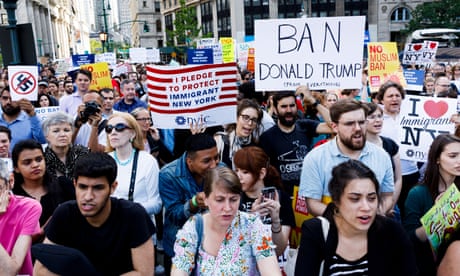
This article is more than
7 year old
Supreme court justice Anthony Kennedy, who has provided crucial swing votes in cases governing core progressive issues including abortion rights and same-sex marriage, announced his retirement on Wednesday in a decision likely to send shockwaves into every corner of US civic life.
The announcement set up a titanic battle between Republicans allied with Donald Trump, who wish to replace Kennedy with a more reliably conservative justice, and Democrats who fear that a new Trump appointment could give the court a decisive conservative bent for generations.
Kennedy’s retirement takes effect on 31 July, after which Trump will be free to put forward a nominee to replace him. The White House maintains a list of possible Trump nominees.
“It has been the greatest honor and privilege to serve our nation in the federal judiciary for 43 years, 30 of those years on the supreme court,” Kennedy, 81, said in a statement, describing a “deep desire” to spend more time with his family. He was sworn in on 18 February 1988.
The retirement could portend a showdown on Roe v Wade, the 1973 decision protecting abortion rights, said Renato Mariotti, a former federal prosecutor.
“Trump has consistently signaled his intention to select very conservative jurists, and the Senate eliminated the filibuster for supreme court nominees,” Mariotti told the Guardian. “So unless the Democrats retake the Senate, which is unlikely, Trump will be able to select a justice who would vote to overturn Roe.”
For years, Kennedy sat at the ideological center of the court, occasionally siding with liberal justices while ruling with the conservative majority in key decisions on campaign finance, warrantless wiretapping and an assault on the Voting Rights Act.
Apart from abortion rights, a rightward shift on the court could endanger affirmative action programs, activists said, while blocking progress on a death penalty ban and other issues.
Neal Katyal, who argued the case against Trump’s travel ban before the court, warned on Twitter that the court risked parting ways with the public.
“This Supreme Court has diverged from the heart of America,” Katyal tweeted. He warned that the Senate, which is controlled by Republicans and can approve the next nominee on a majority vote, “must carefully scrutinize everything about a nominee’s positions,” particularly given the treatment of Merrick Garland, whose nomination Republicans refused to consider in a gamble that paid off when Trump won the presidential election.

Kennedy, who will turn 82 next month, was nominated by Ronald Reagan and is the longest-serving of the court’s nine justices. Ruth Bader Ginsburg, 85, is older, but she has said she is not considering retirement.
Josh Blackman, a law professor who was in the court on Wednesday, noted that Kennedy’s wife, Mary Kennedy, had attended the session, along with children and grandchildren.
One of Trump’s most popular actions with his political base so far was his nomination last year of the conservative justice Neil Gorsuch, and Trump has promised to tap an equally conservative judge as his second pick, given the chance.
Each of the previous four presidents has filled two supreme court vacancies, including George HW Bush, who served only one term.